Law of torts доклад
Обновлено: 19.05.2024
1. consideration
[kdnsidəreiʃn]
2. implied
3. expressed
4. intention
5. enforceable
6. to set forth
7. dispute
8. offer
9. acceptance
10. promise
11. valid
[im’plaid]
[iks’prest]
[in'tenʃən]
[in’fᴐ:səbəl]
[set fᴐ:ɵ]
[dis'pju:t]
[‘ofə]
[ak'septəns]
[’promis]
[vælid]
12. wrong
13. breach
14. claim
15. restitution
[roŋ]
[bri:tf]
[kleim]
[,resti'tju:ʃən]
16. tangible
17. damage
18. injured person
19. negligence
20. nuisance
[’tænʤəbl]
[dæmiʤ]
['inʤəd ‘рɜsn]
['negliʤəns]
[‘nju:sns]
встречное
удовлетворение
(предоставление)
подразумеваемый
явный
намерение
имеющий исковую силу
устанавливать; закреплять
спор
оферта; предложение
акцептование; одобрение
договорная обязанность
действующий; надлежаще оформленный
вред
нарушение
иск
возмещение;
восстановление
первоначального правового положения
реальный
ущерб
потерпевший, пострадавший
небрежность
злоупотребление правом
4. Exercises:
Exercise 1. Match the words with similar meaning and translate:
1. term
a. conflict
2. dispute
b. obligation
3. tort
c. guarantee
4. liability
d. legitimate
5. to ensure
e. harm
6. damage
f. condition
7. valid
g. to get
8. to obtain
h. wrong
5. Exercises:
Exercise 2. Match the words to make the word combinations and
translate :
1.breach of
2. non-contractual
3. unjust
4. bodily
5. tangible
6. action for
7. unliquidated
8. international
9. strict
Exercise 3. Match the terms with the definitions and translate :
1. strict liability
2. tangible property
3. tortfeasor
4. claim
5. compensation
6. negligence
7. restitution
a. a person who has committed a tort
b. a demand for a remedy in a civil action
c. the return of property to the owner or person entitled to possession
d. property that has physical existence, for example land
e. payment made by someone to cover the cost of damage
f. total liability for an offence which has been committed
whether you are at fault or not
g. lack of proper care or a tort of acting carelessly towards others so as to
cause harm entitling the injured party to claim damages
Ex.2: Read the text again aloud.
A tort is a civil wrong, other than a breach of contract. The term itself comes «from French and
means, literally, “a wrong”. A tort is a breach of a non-contractual duty potentially owed to the entire
world, imposed by law. The majority of legal claims are brought in tort.
Tort law is distinguished from the law of contract, the law of restitution, the law of equity and the
criminal law. Contract law protects expectations arising from promises, restitution prevents unjust
enrichment, equity seeks to ensure that people act properly in certain circumstances, and criminal law
punishes wrongs that are so severe that a state has a direct interest in preventing them (such as murder).
Many wrongs can result in liability to the state as crimes and to the victim as torts.
Tort law serves to protect a person’s interest in his or her bodily security, tangible property,
financial resources, or reputation. Interference with one of these interests is redressable by an action for
compensation, usually in the form of unliquidated damages. The law of torts aims to restore the injured
person to the position he or she was in before the tort was committed.
In most countries, torts are typically divided into three broad categories — intentional torts,
negligence and nuisance. Some torts are strict liability torts.
7. EXERCISES
Ex3.: Are the sentences are True or False. Correct the False ones.
1.
A tort is a civil wrong, other than a contract.
2.
The term tort means “a wrong”.
3.
The minority of legal claims are brought in tort.
4.
Contract law punishes wrongs that are so severe that a state has a direct interest in
preventing them (such as murder).
5.
Tort law serves to protect a person’s interest in his or her bodily security, tangible
property, financial resources, or reputation.
6.
The law of torts restores the injured person.
7.
In most countries, torts are typically divided into intentional and unintentional.
Translate from English into Russian/ from Russian into English:
intentional tort
contract law
civil wrong
breach of the contract
tort law
injured person
nuisance
Вмешательство в частную жизнь
неумышленное гражданское правонарушение
незаконное обогащение
обязанности, непредусмотренные контрактом
материальное имущество
неликвидные убытки
личная неприкосновенность
9. Exercises:
4. Look at the diagram about categories and examples of torts. Use dictionary to find out the meaning of the
unknown words.
Tort
Intentional
invasion of privacy
false imprisonment
emotional distress
assault
defamation
nuisance
battery
• deceit
• trespass
• conversion
Unintentional
• negligence
10. Grammar: Pronouns
Местоимение (Pronoun) - часть речи, которая указывает на лицо, предметы, их признаки, количество,
но не называет их. Местоимения обычно употребляются в предложении вместо имени существительного или
имени прилагательного, иногда - вместо наречия и числительного. Местоимения делятся на несколько групп,
каждая из которых имеет свои собственные грамматические характеристики:
личные местоимения (Personal Pronouns) являются показателями лица и имеют форму именительного
и объектного падежа. Эти местоимения употребляются вместо существительных. Личные местоимения
3-его лица he (он), she (она) употребляются вместо существительных, обозначающих лиц мужского или
женского пола, а местоимение it (он, она, оно) употребляется вместо существительных, обозначающих
неодушевленные предметы и названия животных:
He was rich.- Он был богат.
Here is a new dictionary. I bought it last week. -Вот новый словарь. Я купил его на прошлой неделе.
притяжательные местоимения (Possessive Pronouns) отвечают на вопрос чей? и служат определениями
к существительным и всегда занимают место перед определяемыми существительными. Если возникает
необходимость употребить притяжательное местоимение без существительного, то существует
специальная форма, которая называется абсолютной формой.
Do you know your lesson today? - Ты выучил свой урок сегодня?
This is not my pen. It's hers. - Это не моя ручка. Это её.
11. Grammar: Pronouns
возвратные местоимения (Reflexive Pronouns), оканчивающиеся на -self (-selves во множественном числе), показывают, что
действие, называемое в предложении, направлено на лицо, которое его выполняет, следовательно возвратное местоимение должно
быть по форме соотнесено с подлежащим. На русский язык они переводятся возвратным глагольным суффиксом "-ся (- сь)" или
местоимением "сам себя (себе, собой)". Например:
She washed herself.- Она умылась.
They talked about themselves.- Они говорили о себе.
I can take care of myself.- Я могу позаботиться о себе сам.
указательные местоимения (Demonstrative Pronouns) указывают на лицо или предмет или на их признаки. Указательные
местоимения имеют формы единственного числа: this (этот), that (тот) и множественного числа: these (эти), those (те). Местоимения
such (такой, такого рода, подобный) и (the) same (тот же самый, те же самые) категории числа не имеют. В качестве указательного
местоимения может употребляться и местоимение it (это):
This is a map of the world. -Это карта мира.
Read the same text, please! - Читайте тот же самый текст, пожалуйста!
12. Grammar: Pronouns
I-я
he - он
she - она
it- оно
we - мы
you- ты
they - они
me - мне
him- ему
her- ей
it- ему
us - нам
you - тебе
them - им
my - мой his - его her - её its - его our - наш your- твойtheir - их -
абсолютная
форма
Притяжательные
местоимения
присоединяема
я
форма
объектный
падеж
именительный
падеж
Личные
местоимения
mine
his
hers
its
ours
yours
theirs
Возвратные
местоимения
(себя)
Grammar: Pronouns
myself
himself
herself
itself
ourselves
yourself (-ves)
themselves
13. Grammar: Pronouns
вопросительные местоимения (Interrogative Pronouns) служат для образования специальных вопросов. К вопросительным
местоимениям относятся местоимения who (кто), whom (кого, кому),whose (чей), what (что, кто (по профессии), какой), which
(который):
Не always knows what is what. - Он всегда знает, что к чему.
Whom are you speaking to? - С кем ты разговариваешь?
относительные (Relative) и соединительные (союзные) местоимения (Conjunctive Pronouns) служат для связи придаточных
предложений с главным. Они являются союзными словами, которые отличаются от союзов тем, что они не только связывают
придаточное предложение с главным, но и являются членами придаточного предложения. Для связи придаточных предложений
главным употребляются местоимения who (кто), whom (кого, кому), whose (чей), what (что, то что, какой), which (который, какой):
Who has done it is unknown.- Кто это сделал, неизвестно.
I do not know which of them speaks Russian.- Я не знаю, кто из них говорит по-русски.
неопределенные местоимения (Indefinite Pronouns) указывают на неизвестные, неопределенные предметы, признаки,
количества. Это местоимения: some/any (какой-то, какая-то, какой-нибудь, какой-либо), somebody/someone (кто-то), something
(что-то), anybody/anyone (кто-нибудь, кто-либо, кто-то), anything (что-нибудь, что-либо, что-то), other/another (другой, иной):
Не had been obliged to think of others.- Он был обязан ду-мать о других.
Is there anybody at home? - Дома кто-нибудь есть?
14. Grammar: Pronouns
отрицательные местоимения (Negative Pronouns) служат для отрицания наличия какого-либо
предмета, признака, качества: no (никакой, никакая, никакое, никакие), none (никто, ничто, ни один),
neither (ни тот, ни другой), no one/none (никто, ни один, никого), nobody (никто, никого), nothing (ничто):
But nothing happened.- Но ничего не случилось.
"Have you got any newspapers?" "No. I have got none".- "У вас есть газеты?" "Нет. Абсолютно никаких."
обобщающие местоимения (Universal Pronouns) указывают на каждый из предметов, принадлежащих к
ряду однородных: all (все, всё), both (оба, обе), either (и тот и другой), each (каждый), every (каждый,
всякий), everybody/everyone (все), everything (всё), other/another (другой, другие), one (любой):
Every student gets a record book.- Каждый студент получает зачетку.
15. Grammar: Pronouns: Exercises
1. Спишите предложения, подчеркните местоимения и определите их вид. Переведите предложения.
1.That was he who helped me in my work. 2. This house is high. Its windows are large. 3. I was very busy yesterday.
4. Everything will remain the same, I believe. 5. Не told me about this. 6. Who is that? 7. All is ready. 8. I know what
you mean. 9. That is not what I want. 10. That's the man whose car is been stolen. 11. There is the man whom we saw
yesterday. 12. Without peace there can be no social or economic progress.13. This is the man who wants to see you.
14. This newspaper is very popular with our students. 15. We both like coffee. 16. What are you reading about?
2.Спишите предложения, выбрав соответствующую форму местоимения. Переведите предложения.
1. They saw (you/your) there. 2. Не showed (their/them) his library. 3. (I/my) should like to go there with
(yourself/you). 4. (Whom/whose) article are (you/your) reading? 5. But with (nobody/ no) to give him orders he had
(nobody/nothing) to do. 6. The question is (whom/whose) (us/we) must complain to. 7. The pen (which/who) you
took is (my/mine).
16. Grammar: Pronouns: Exercises
3. Спишите предложения, подчеркните местоимения that, those, one, ones заменяющие
существительные. Переведите предложения на русский язык.
Модель:
Each state has its own system of courts similar to that of the Federal courts. - Каждый штат имеет свою
систему судов, схожую с системой федеральных судов.
The legislative function of a government consists of making new laws and alteration of the old ones. Законодательная функция правительства состоит в создании новых законов и изменении прежних
(законов).
1. Decisions and sentences excluding those passed by the Supreme Court may be appealed against in a court of higher
instance. 2. All organs of state power in our country are elected ones. 3. Winter in England is milder than that on the
continent. 4. Among other duties of the Procurator's Office are those concerned with investigating criminal cases. 5.
British Parliament can make new laws and repeal old ones. 6. English words are shorter than those of the Russian
language.
17. Grammar: Pronouns: Exercises
18. EXERCISES
Ex.1: Match the words and word combinations with their translation
1.
деликт-
a. unjust enrichment
2.
гражданское правонарушение-
b. bodily security
3.
нарушение-
c. intentional tort
4.
судебный иск-
d. tort
5.
несправедливое обогащение-
e. reputation
6.
уголовное право-
f. civil wrong
7.
договорное право-
g. negligence
8.
физическая безопасность-
h. breach
9.
защита интересов-
i. protection of interests
10.
репутация-
j. legal claim
11.
преднамеренный деликт-
k. criminal law
12.
халатность-
l. contract law
19. EXERCISES
Ex. 1. Choose the correct form of the possessive pronouns in brackets.
1. It may be (our, ours) dictionaries.
2. He has not read a line of (your, yours). How can he criticise (your, yours) poems?
3. His composition is much more interesting than (your, yours) or (my, mine).
4. (Their, theirs) knowledge of the subject is not much superior to (our, ours).
5. I’m afraid they will take (her, hers) advice not (your, yours).
6. All (our, ours) clothes were extremely dirty, and (my, mine) especially so.
7. Will you help me to sort out the things? I cannot tell which are (your, yours) and which
are (my, mine).
8. This is (your, yours) note-book, but where is (my, mine)?
20. EXERCISES
Ex.2: Complete these sentences using myself/yourself, etc.
Example: Here is the money, go and buy yourself an ice-cream.
1.
Be careful! That pan is very hot. Don’t burn……. .
2.
I want to know you better. Tell me about………….
3.
It isn’t her fault. She really shouldn’t blame…………
4.
Did you make the dress…..
5.
The boy was lucky when he fell down the stairs. He didn’t hurt….
6.
Tom cut…….while he was shaving this morning.
7.
He spends most of his time alone, so it’s not surprising that he talks to……..
8.
Don’t worry about us. We can look after…….
?
21. EXERCISES
Ex.3: Insert this, that, these, those or it.
1. All…..is very interesting.
2…….will do.
3. None of…..present expressed any surprise on hearing….
4. Try one of….
5. What is this? -……is a computer.
6. …….are the TV sets of the latest type.
7. Suddenly I felt something soft and warm on my knees……was a cat.
8. Who were you talking with? -…….was a friend of mine.
22. EXERCISES
Ex.4: Translate into English using interrogative pronouns.
1. Кто знает этого человека?
2. Кто из вас разбил эту вазу?
3. Кого из них вы спрашивали об этом?
4. Кого вы ждете здесь?
5. Кому вы дали свой словарь?
23. EXERCISES
Ex.5: Put in some or any only where possible.
1.
The natives eat……meat raw.
2.
There wasn’t…….meat in the fridge.
3.
…….life is full of surprises.
4.
There isn’t…….life in that girl.
5.
Buy ……..bread and cheese for the picnic.
6.
We can’t do without……..bread.
7.
……..spices are bad for you.
8.
Put…….spices into the soup.
TEST
Tort law + pronouns
I.
1) Choose the correct form of possessive pronouns in brackets.
1. She got to (her, hers) feet and took (his, him) hand.
2. “Let me see your passports,” I gave him___and Catherine got___out of____handbag (my,
mine; her, hers; her, hers).
3. Mind own___ business and I’ll mind____ (your, yours; my, mine).
4. Mr. Black gave (his, him) wife a leather bag for (her, hers) birthday.
5. The next voice to speak up was not the Lieutenant’s but (my, mine).
2) Insert reflexive pronouns where necessary.
1. He shaves_____every other day.
2. Go and wash____.
3. She washed_____quickly and went to prepare breakfast.
4. He likes his wife to dress______well.
5. Behave______!
3) Put in some or any only where possible.
1. I like…..biscuits and….. sweets.
2. I bought…….. biscuits for tea.
3. I don’t like…….boiled cabbage.
4. Would you like……boiled cabbage?
5. …….money has to be earned.
4) Use one of the demonstrative pronouns in the following sentences.
1……..is cooking oil, I always buy…..one.
2. She gave me the…… present as a year before.
3. What do you want me to do with…….thing?
4. He was one of………men whom women all like.
5. Do you see……..bushes on the other side of the river?
5) Translate into English using interrogative pronouns.
1. Какой это цвет?
2. На каком этаже вы живете?
3. Что вы купили?
4. Какой месяц самый короткий?
5. Какой метод вы используете?
II. Translate from Russian into English.
1. Деликт является гражданским правонарушением, за исключением нарушения
договора.
2. В большинстве стран деликты, как правило, делятся на преднамеренные и
непреднамеренные деликты.
3. Закон о правонарушениях защищает интересы человека, его физическую
безопасность, имущество, финансы или репутацию.
4. Вмешательство в один из этих интересов возмещается иском о компенсации.
5. Некоторые деликты являются деликтами со строгой ответственностью.
Вы можете изучить и скачать доклад-презентацию на тему TORT LAW. Презентация на заданную тему содержит 26 слайдов. Для просмотра воспользуйтесь проигрывателем, если материал оказался полезным для Вас - поделитесь им с друзьями с помощью социальных кнопок и добавьте наш сайт презентаций в закладки!


























Exercises: Exercise 1. Match the words with similar meaning and translate: 1. term a. conflict 2. dispute b. obligation 3. tort c. guarantee 4. liability d. legitimate 5. to ensure e. harm 6. damage f. condition 7. valid g. to get 8. to obtain h. wrong
Exercises: Exercise 2. Match the words to make the word combinations and translate : 1.breach of 2. non-contractual 3. unjust 4. bodily 5. tangible 6. action for 7. unliquidated 8. international 9. strict Exercise 3. Match the terms with the definitions and translate : 1. strict liability 2. tangible property 3. tortfeasor 4. claim 5. compensation 6. negligence 7. restitution a. a person who has committed a tort b. a demand for a remedy in a civil action c. the return of property to the owner or person entitled to possession d. property that has physical existence, for example land e. payment made by someone to cover the cost of damage f. total liability for an offence which has been committed whether you are at fault or not g. lack of proper care or a tort of acting carelessly towards others so as to cause harm entitling the injured party to claim damages
EXERCISES Ex3.: Are the sentences are True or False. Correct the False ones. A tort is a civil wrong, other than a contract. The term tort means “a wrong”. The minority of legal claims are brought in tort. Contract law punishes wrongs that are so severe that a state has a direct interest in preventing them (such as murder). Tort law serves to protect a person’s interest in his or her bodily security, tangible property, financial resources, or reputation. The law of torts restores the injured person. In most countries, torts are typically divided into intentional and unintentional.
Exercises: 4. Look at the diagram about categories and examples of torts. Use dictionary to find out the meaning of the unknown words. Tort Intentional Unintentional invasion of privacy • negligence • false imprisonment • emotional distress • assault • defamation • nuisance • battery • deceit • trespass • conversion
Grammar: Pronouns Местоимение (Pronoun) - часть речи, которая указывает на лицо, предметы, их признаки, количество, но не называет их. Местоимения обычно употребляются в предложении вместо имени существительного или имени прилагательного, иногда - вместо наречия и числительного. Местоимения делятся на несколько групп, каждая из которых имеет свои собственные грамматические характеристики: личные местоимения (Personal Pronouns) являются показателями лица и имеют форму именительного и объектного падежа. Эти местоимения употребляются вместо существительных. Личные местоимения 3-его лица he (он), she (она) употребляются вместо существительных, обозначающих лиц мужского или женского пола, а местоимение it (он, она, оно) употребляется вместо существительных, обозначающих неодушевленные предметы и названия животных: He was rich.- Он был богат. Here is a new dictionary. I bought it last week. -Вот новый словарь. Я купил его на прошлой неделе. притяжательные местоимения (Possessive Pronouns) отвечают на вопрос чей? и служат определениями к существительным и всегда занимают место перед определяемыми существительными. Если возникает необходимость употребить притяжательное местоимение без существительного, то существует специальная форма, которая называется абсолютной формой. Do you know your lesson today? - Ты выучил свой урок сегодня? This is not my pen. It's hers. - Это не моя ручка. Это её.
Grammar: Pronouns возвратные местоимения (Reflexive Pronouns), оканчивающиеся на -self (-selves во множественном числе), показывают, что действие, называемое в предложении, направлено на лицо, которое его выполняет, следовательно возвратное местоимение должно быть по форме соотнесено с подлежащим. На русский язык они переводятся возвратным глагольным суффиксом "-ся (- сь)" или местоимением "сам себя (себе, собой)". Например: She washed herself.- Она умылась. They talked about themselves.- Они говорили о себе. I can take care of myself.- Я могу позаботиться о себе сам. указательные местоимения (Demonstrative Pronouns) указывают на лицо или предмет или на их признаки. Указательные местоимения имеют формы единственного числа: this (этот), that (тот) и множественного числа: these (эти), those (те). Местоимения such (такой, такого рода, подобный) и (the) same (тот же самый, те же самые) категории числа не имеют. В качестве указательного местоимения может употребляться и местоимение it (это): This is a map of the world. -Это карта мира. Read the same text, please! - Читайте тот же самый текст, пожалуйста!
Grammar: Pronouns вопросительные местоимения (Interrogative Pronouns) служат для образования специальных вопросов. К вопросительным местоимениям относятся местоимения who (кто), whom (кого, кому),whose (чей), what (что, кто (по профессии), какой), which (который): Не always knows what is what. - Он всегда знает, что к чему. Whom are you speaking to? - С кем ты разговариваешь? относительные (Relative) и соединительные (союзные) местоимения (Conjunctive Pronouns) служат для связи придаточных предложений с главным. Они являются союзными словами, которые отличаются от союзов тем, что они не только связывают придаточное предложение с главным, но и являются членами придаточного предложения. Для связи придаточных предложений главным употребляются местоимения who (кто), whom (кого, кому), whose (чей), what (что, то что, какой), which (который, какой): Who has done it is unknown.- Кто это сделал, неизвестно. I do not know which of them speaks Russian.- Я не знаю, кто из них говорит по-русски. неопределенные местоимения (Indefinite Pronouns) указывают на неизвестные, неопределенные предметы, признаки, количества. Это местоимения: some/any (какой-то, какая-то, какой-нибудь, какой-либо), somebody/someone (кто-то), something (что-то), anybody/anyone (кто-нибудь, кто-либо, кто-то), anything (что-нибудь, что-либо, что-то), other/another (другой, иной): Не had been obliged to think of others.- Он был обязан ду-мать о других. Is there anybody at home? - Дома кто-нибудь есть?
Grammar: Pronouns отрицательные местоимения (Negative Pronouns) служат для отрицания наличия какого-либо предмета, признака, качества: no (никакой, никакая, никакое, никакие), none (никто, ничто, ни один), neither (ни тот, ни другой), no one/none (никто, ни один, никого), nobody (никто, никого), nothing (ничто): But nothing happened.- Но ничего не случилось. "Have you got any newspapers?" "No. I have got none".- "У вас есть газеты?" "Нет. Абсолютно никаких." обобщающие местоимения (Universal Pronouns) указывают на каждый из предметов, принадлежащих к ряду однородных: all (все, всё), both (оба, обе), either (и тот и другой), each (каждый), every (каждый, всякий), everybody/everyone (все), everything (всё), other/another (другой, другие), one (любой): Every student gets a record book.- Каждый студент получает зачетку.
Grammar: Pronouns: Exercises 1. Спишите предложения, подчеркните местоимения и определите их вид. Переведите предложения. 1.That was he who helped me in my work. 2. This house is high. Its windows are large. 3. I was very busy yesterday. 4. Everything will remain the same, I believe. 5. Не told me about this. 6. Who is that? 7. All is ready. 8. I know what you mean. 9. That is not what I want. 10. That's the man whose car is been stolen. 11. There is the man whom we saw yesterday. 12. Without peace there can be no social or economic progress.13. This is the man who wants to see you. 14. This newspaper is very popular with our students. 15. We both like coffee. 16. What are you reading about? 2.Спишите предложения, выбрав соответствующую форму местоимения. Переведите предложения. 1. They saw (you/your) there. 2. Не showed (their/them) his library. 3. (I/my) should like to go there with (yourself/you). 4. (Whom/whose) article are (you/your) reading? 5. But with (nobody/ no) to give him orders he had (nobody/nothing) to do. 6. The question is (whom/whose) (us/we) must complain to. 7. The pen (which/who) you took is (my/mine).
Grammar: Pronouns: Exercises 3. Спишите предложения, подчеркните местоимения that, those, one, ones заменяющие существительные. Переведите предложения на русский язык. Модель: Each state has its own system of courts similar to that of the Federal courts. - Каждый штат имеет свою систему судов, схожую с системой федеральных судов. The legislative function of a government consists of making new laws and alteration of the old ones. - Законодательная функция правительства состоит в создании новых законов и изменении прежних (законов). 1. Decisions and sentences excluding those passed by the Supreme Court may be appealed against in a court of higher instance. 2. All organs of state power in our country are elected ones. 3. Winter in England is milder than that on the continent. 4. Among other duties of the Procurator's Office are those concerned with investigating criminal cases. 5. British Parliament can make new laws and repeal old ones. 6. English words are shorter than those of the Russian language.
EXERCISES Ex.1: Match the words and word combinations with their translation деликт- a. unjust enrichment гражданское правонарушение- b. bodily security нарушение- c. intentional tort судебный иск- d. tort несправедливое обогащение- e. reputation уголовное право- f. civil wrong договорное право- g. negligence физическая безопасность- h. breach защита интересов- i. protection of interests репутация- j. legal claim преднамеренный деликт- k. criminal law халатность- l. contract law
EXERCISES Ex. 1. Choose the correct form of the possessive pronouns in brackets. 1. It may be (our, ours) dictionaries. 2. He has not read a line of (your, yours). How can he criticise (your, yours) poems? 3. His composition is much more interesting than (your, yours) or (my, mine). 4. (Their, theirs) knowledge of the subject is not much superior to (our, ours). 5. I’m afraid they will take (her, hers) advice not (your, yours). 6. All (our, ours) clothes were extremely dirty, and (my, mine) especially so. 7. Will you help me to sort out the things? I cannot tell which are (your, yours) and which are (my, mine). 8. This is (your, yours) note-book, but where is (my, mine)?
EXERCISES Ex.2: Complete these sentences using myself/yourself, etc. Example: Here is the money, go and buy yourself an ice-cream. 1. Be careful! That pan is very hot. Don’t burn……. . 2. I want to know you better. Tell me about…………. 3. It isn’t her fault. She really shouldn’t blame………… 4. Did you make the dress….. ? 5. The boy was lucky when he fell down the stairs. He didn’t hurt…. 6. Tom cut…….while he was shaving this morning. 7. He spends most of his time alone, so it’s not surprising that he talks to…….. 8. Don’t worry about us. We can look after…….
EXERCISES Ex.3: Insert this, that, these, those or it. 1. All…..is very interesting. 2…….will do. 3. None of…..present expressed any surprise on hearing….. . 4. Try one of…. 5. What is this? -……is a computer. 6. …….are the TV sets of the latest type. 7. Suddenly I felt something soft and warm on my knees……was a cat. 8. Who were you talking with? -…….was a friend of mine.
EXERCISES Ex.4: Translate into English using interrogative pronouns. 1. Кто знает этого человека? 2. Кто из вас разбил эту вазу? 3. Кого из них вы спрашивали об этом? 4. Кого вы ждете здесь? 5. Кому вы дали свой словарь?
EXERCISES Ex.5: Put in some or any only where possible. 1. The natives eat……meat raw. 2. There wasn’t…….meat in the fridge. 3. …….life is full of surprises. 4. There isn’t…….life in that girl. 5. Buy ……..bread and cheese for the picnic. 6. We can’t do without……..bread. 7. ……..spices are bad for you. 8. Put…….spices into the soup.
- Для учеников 1-11 классов и дошкольников
- Бесплатные сертификаты учителям и участникам
Описание презентации по отдельным слайдам:
The 'Law of Torts' owes its origin to the Common Law of England. It is well developed in the UK, USA and other advanced Countries. In India, Law of Torts is non codified, like other branches of law eg: Indian Contract ACT, 1872 and Indian Penal Code 1860. It is still in the process of development.
The term 'Tort' means a wrongful act committed by a person, causing injury or damage to another one. A tort is a Civil wrong that can be remedied by awarding damages. The civil wrongs result in harm to a person or property. The person who commits or is guilty of a tort is called a "tortfeasor". The person who suffered injury or damage by a tortfeasor is called injured or aggrieved. Tort is a common law term and its equivalent in Civil Law is "Delict". In general, the victim of a tortious act is the plaintiff in a tort case. As a general rule, all persons have the capacity to sue and be sued in a tort. Tort Law provides an avenue for an injured person of a remedy. It does not provide a guarantee of recovery.

Medical negligence Negligent damage to private property Negligence misstatements Trespass Assault Negligence


The parties involved: The state brings an action in Crime A private individuals bring an action in tort The standart of proof Higher in Criminal Law The outcomes A criminal action can result in conviction and punishment. An action in tort may result in liability on the part of the defendant and damages awarded to the claimant
Слайды и текст этой презентации
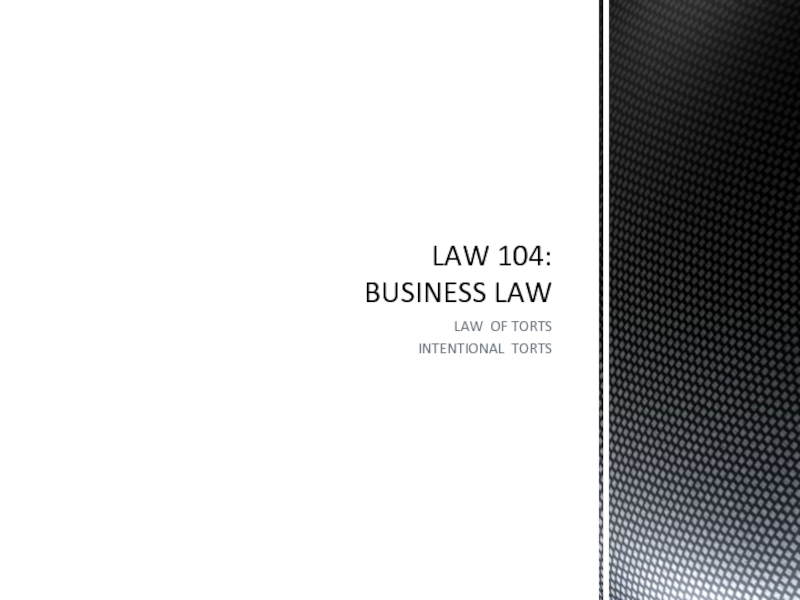
LAW OF TORTS
INTENTIONAL TORTS
LAW 104: BUSINESS LAW
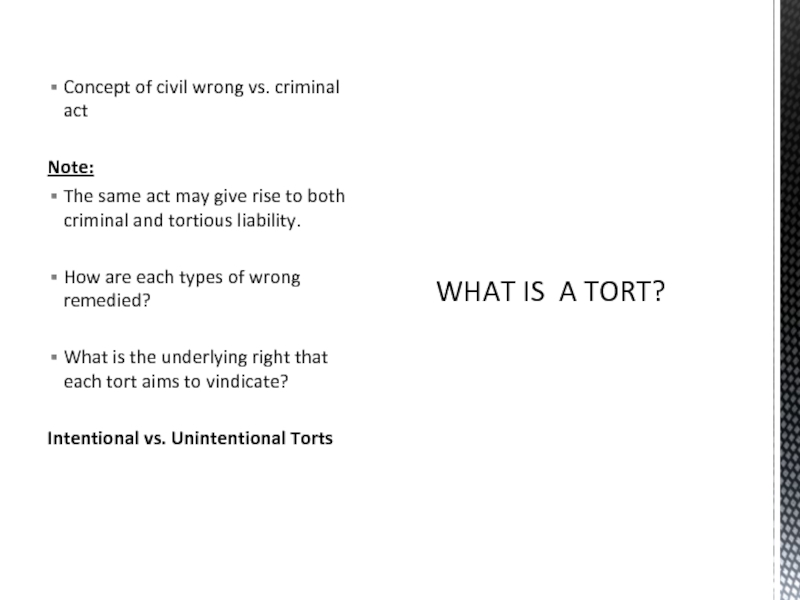
Concept of civil wrong vs. criminal act
Note:
The same act may give rise to both criminal and tortious liability.
How are each types of wrong remedied?
What is the underlying right that each tort aims to vindicate?
Intentional vs. Unintentional Torts
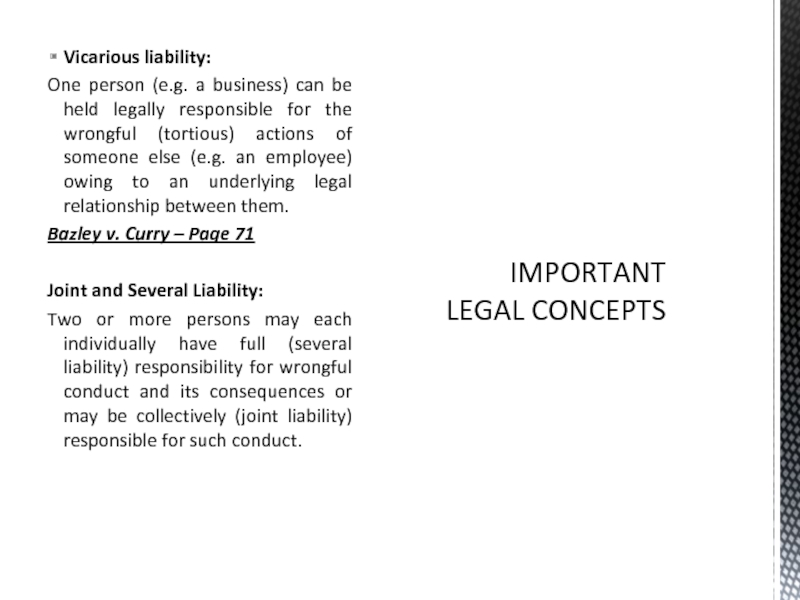
Vicarious liability:
One person (e.g. a business) can be held legally responsible for the wrongful (tortious) actions of someone else (e.g. an employee) owing to an underlying legal relationship between them.
Bazley v. Curry – Page 71
Joint and Several Liability:
Two or more persons may each individually have full (several liability) responsibility for wrongful conduct and its consequences or may be collectively (joint liability) responsible for such conduct.
IMPORTANT LEGAL CONCEPTS
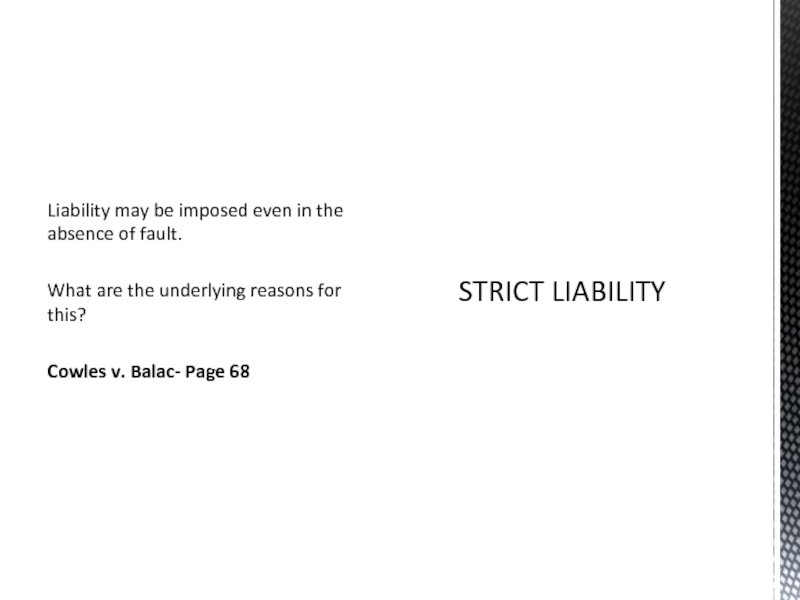
Liability may be imposed even in the absence of fault.
What are the underlying reasons for this?
Cowles v. Balac- Page 68
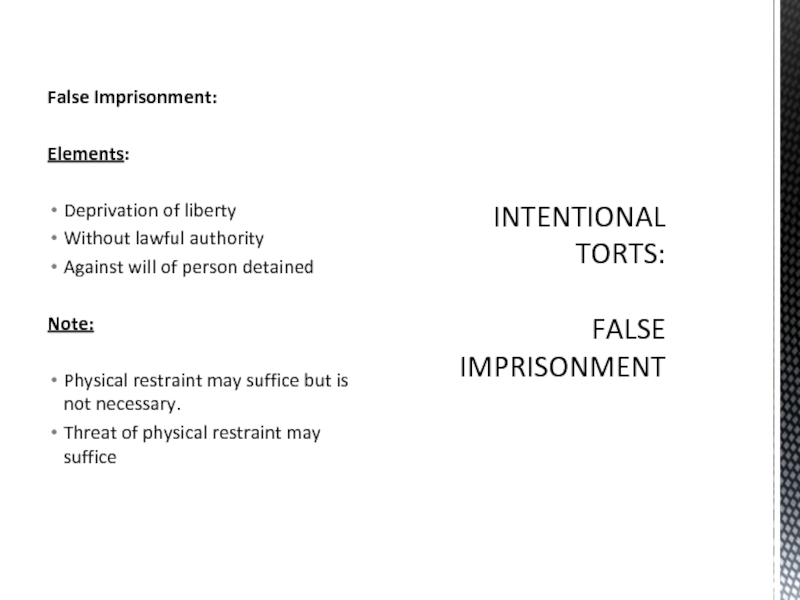
Deprivation of liberty
Without lawful authority
Against will of person detained
Physical restraint may suffice but is not necessary.
Threat of physical restraint may suffice
INTENTIONAL TORTS: FALSE IMPRISONMENT
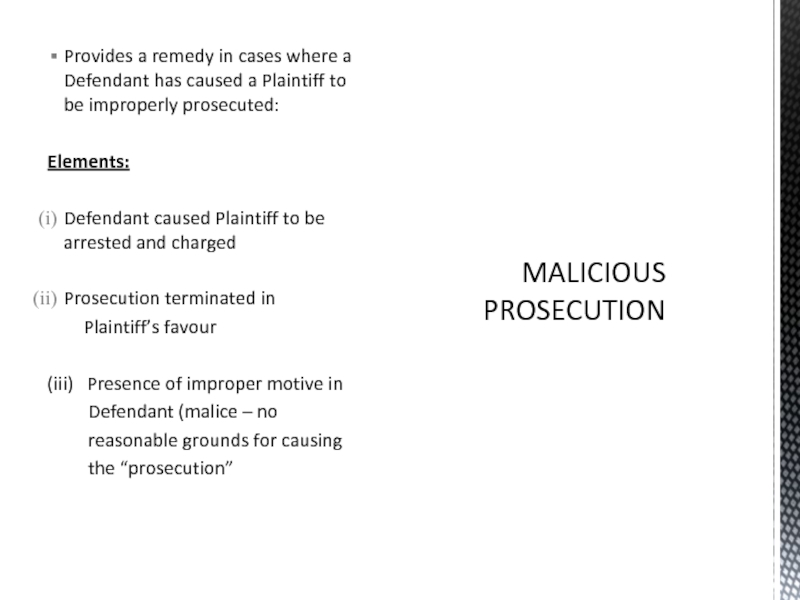
Provides a remedy in cases where a Defendant has caused a Plaintiff to be improperly prosecuted:
Defendant caused Plaintiff to be arrested and charged
Prosecution terminated in
Plaintiff’s favour
(iii) Presence of improper motive in
Defendant (malice – no
reasonable grounds for causing
the “prosecution”
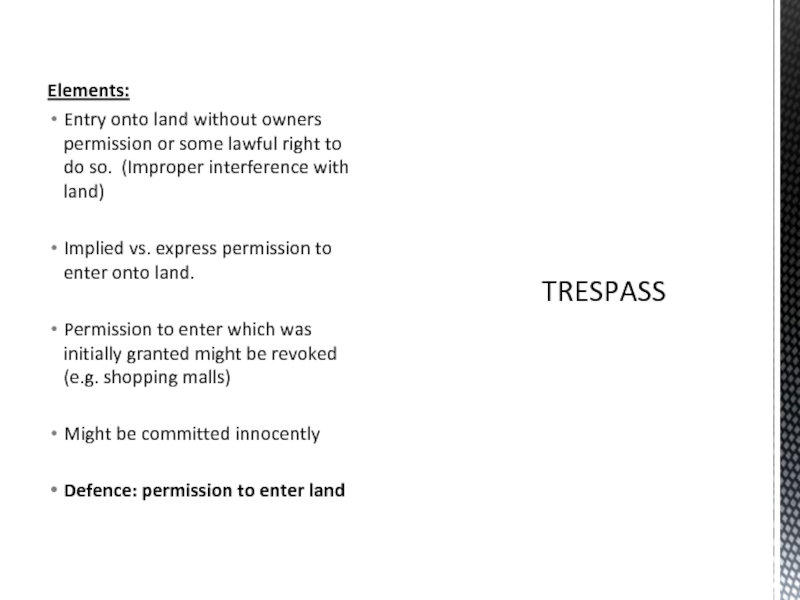
Elements:
Entry onto land without owners permission or some lawful right to do so. (Improper interference with land)
Implied vs. express permission to enter onto land.
Permission to enter which was initially granted might be revoked (e.g. shopping malls)
Might be committed innocently
Defence: permission to enter land
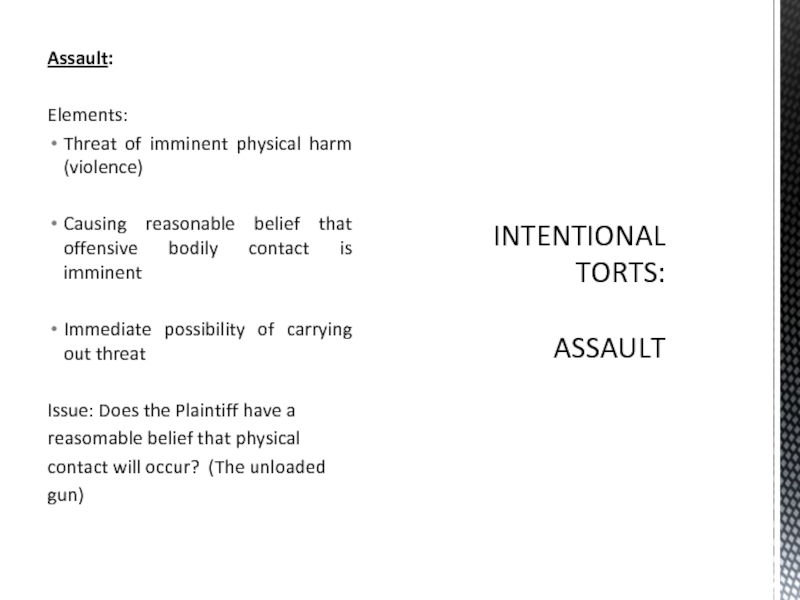
Elements:
Threat of imminent physical harm (violence)
Causing reasonable belief that offensive bodily contact is imminent
Immediate possibility of carrying out threat
Issue: Does the Plaintiff have a
reasomable belief that physical
contact will occur? (The unloaded
gun)
INTENTIONAL TORTS: ASSAULT
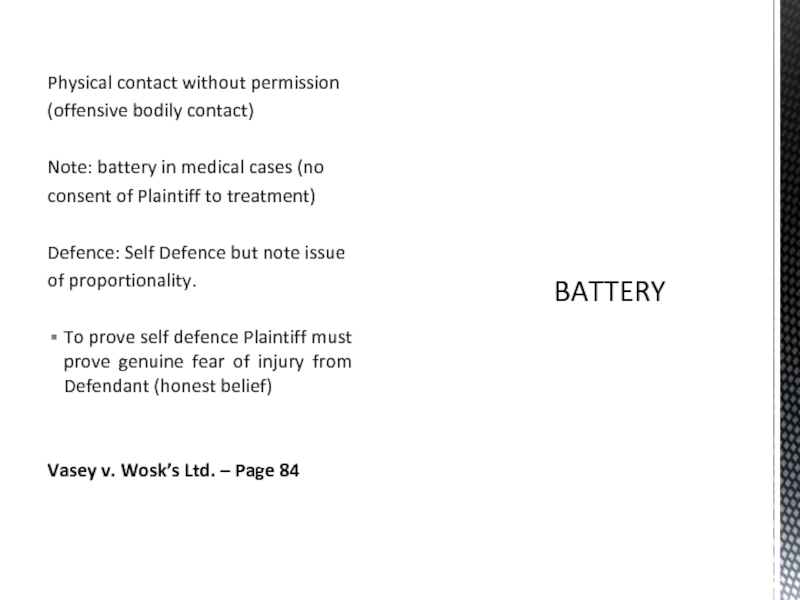
Physical contact without permission
(offensive bodily contact)
Note: battery in medical cases (no
consent of Plaintiff to treatment)
Defence: Self Defence but note issue
of proportionality.
To prove self defence Plaintiff must prove genuine fear of injury from Defendant (honest belief)
Vasey v. Wosk’s Ltd. – Page 84
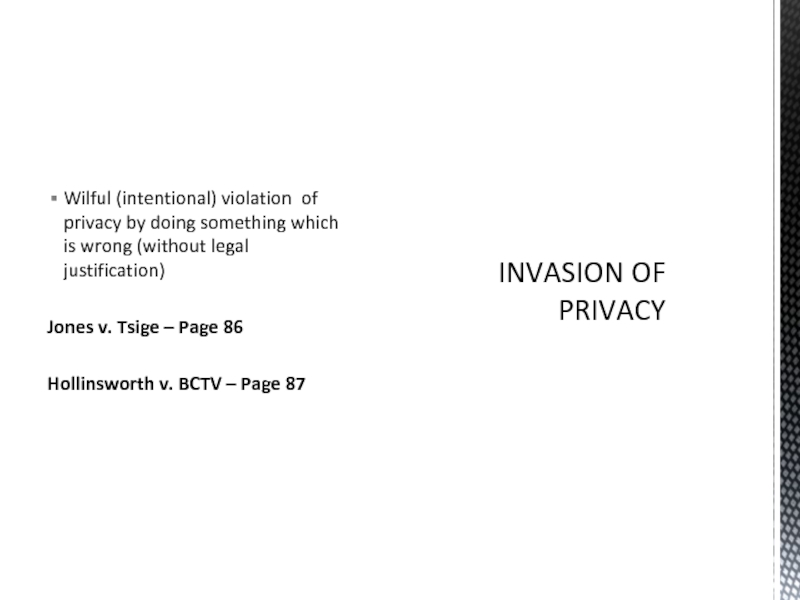
Wilful (intentional) violation of privacy by doing something which is wrong (without legal justification)
Jones v. Tsige – Page 86
Hollinsworth v. BCTV – Page 87
INVASION OF PRIVACY
Unauthorized use of or interference with the property of another
Immaterial whether property initially came into Defendant’s possession lawfully.
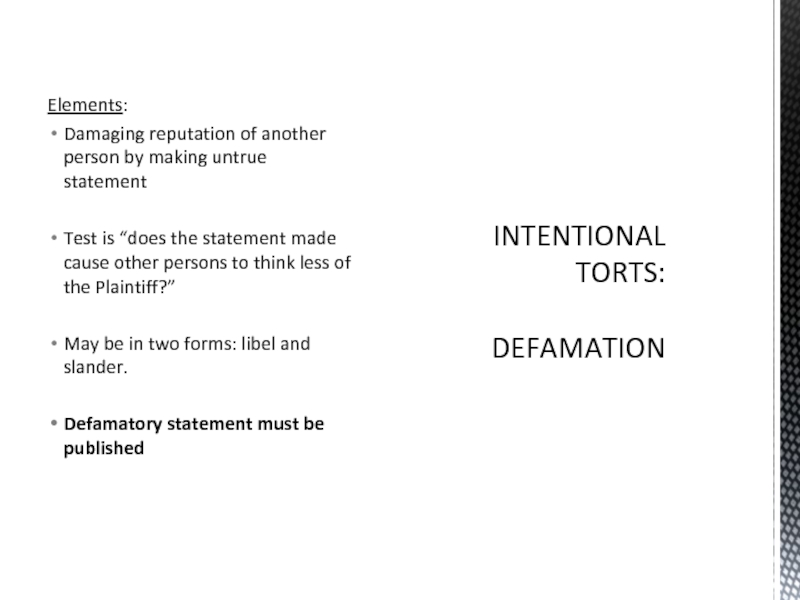
Elements:
Damaging reputation of another person by making untrue statement
Test is “does the statement made cause other persons to think less of the Plaintiff?”
May be in two forms: libel and slander.
Defamatory statement must be published
INTENTIONAL TORTS: DEFAMATION
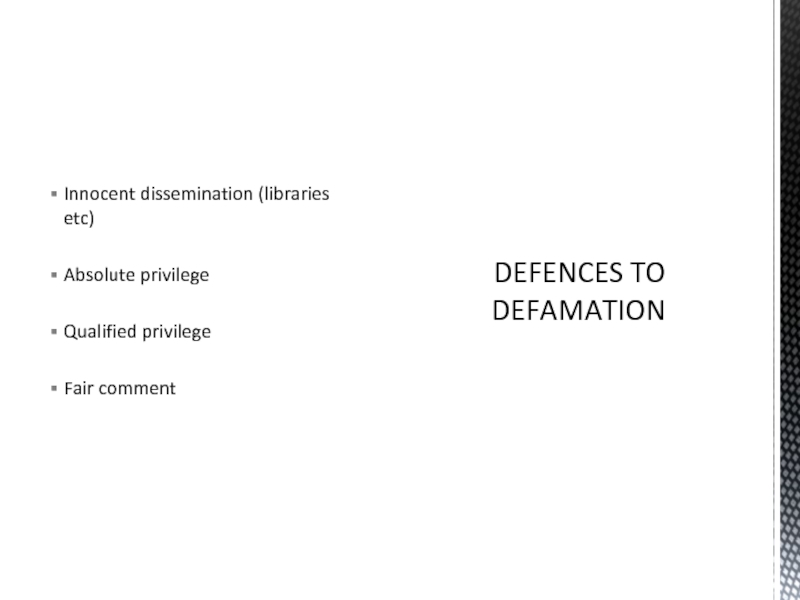
Innocent dissemination (libraries etc)
DEFENCES TO DEFAMATION
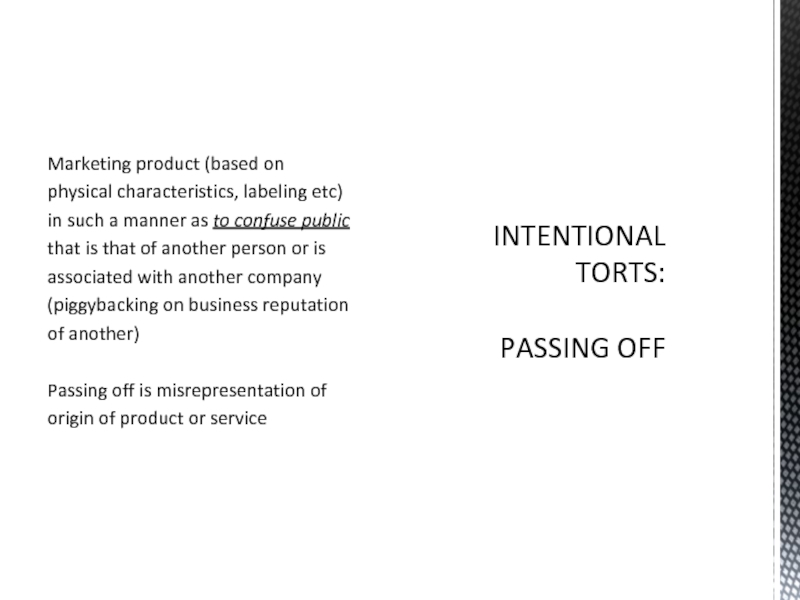
Marketing product (based on
physical characteristics, labeling etc)
in such a manner as to confuse public
that is that of another person or is
associated with another company
(piggybacking on business reputation
of another)
Passing off is misrepresentation of
origin of product or service
INTENTIONAL TORTS: PASSING OFF
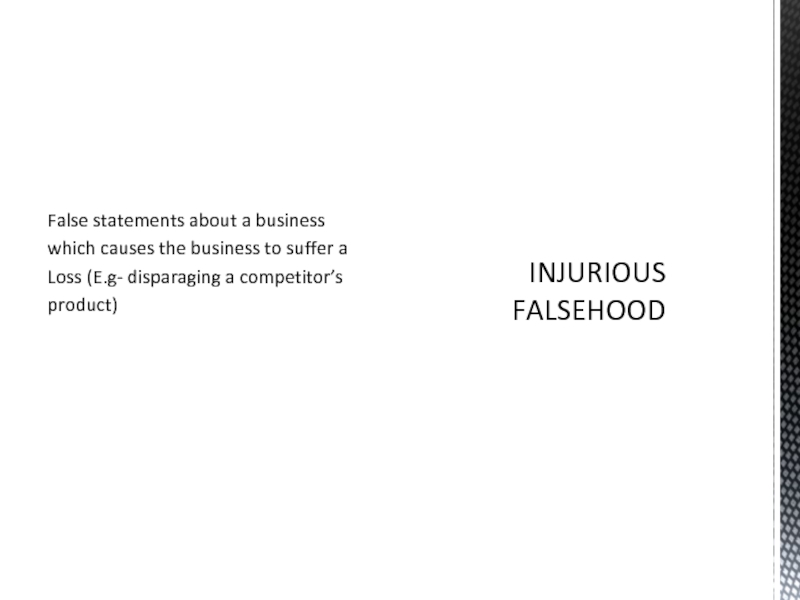
False statements about a business
which causes the business to suffer a
Loss (E.g- disparaging a competitor’s
product)
Intention on part of defendant to injure business of another person.
Interference by illegal or improper
means
Inducing breach of contract
Business intimidation which affects business interests
Inducing breach of duty to maintain information confidential.
See: Lumley v. Gye – Page 110
Reach MD – Page 111
UNLAWFUL INTERFERENCE WITH ECONOMIC RELATIONS
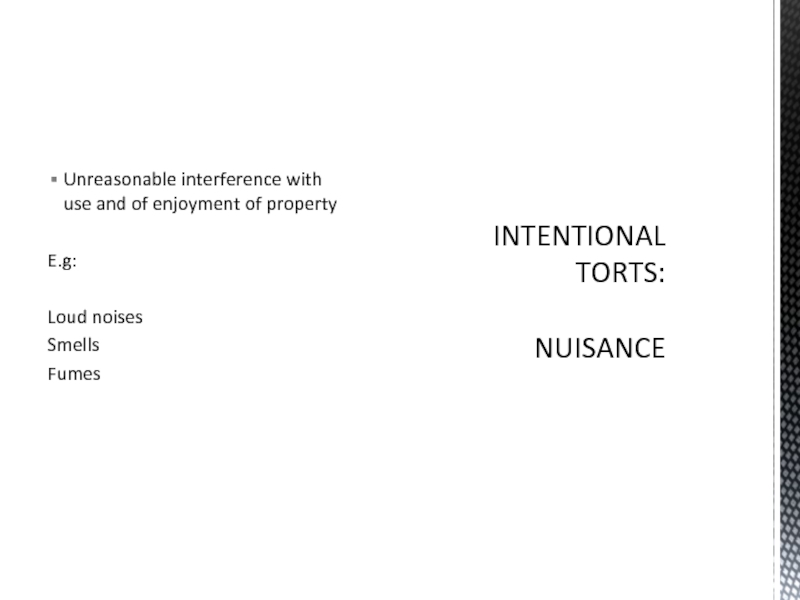
Unreasonable interference with use and of enjoyment of property
INTENTIONAL TORTS: NUISANCE
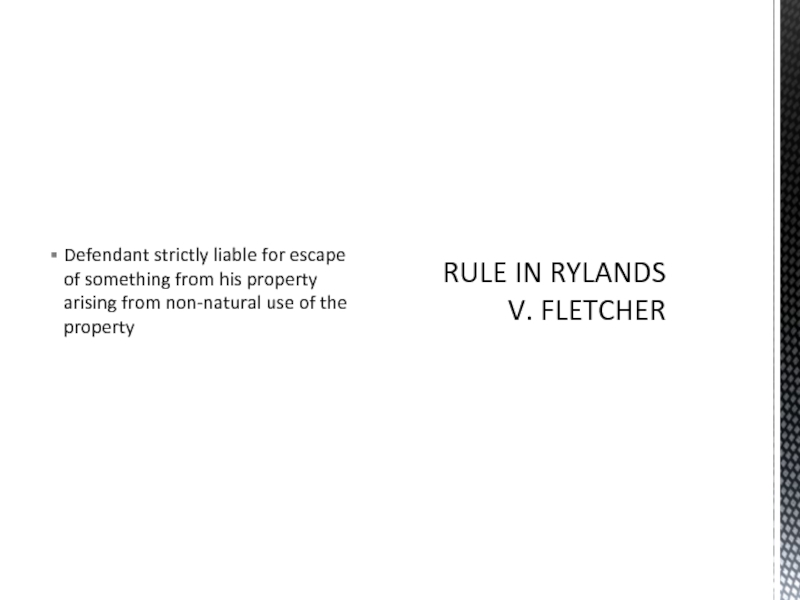
Defendant strictly liable for escape of something from his property arising from non-natural use of the property
RULE IN RYLANDS V. FLETCHER
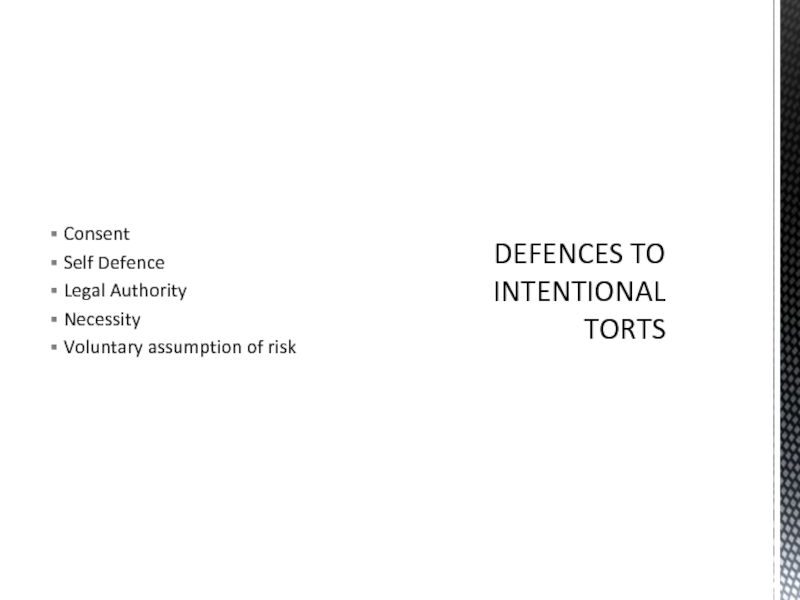
Consent
Self Defence
Legal Authority
Necessity
Voluntary assumption of risk
Читайте также:

